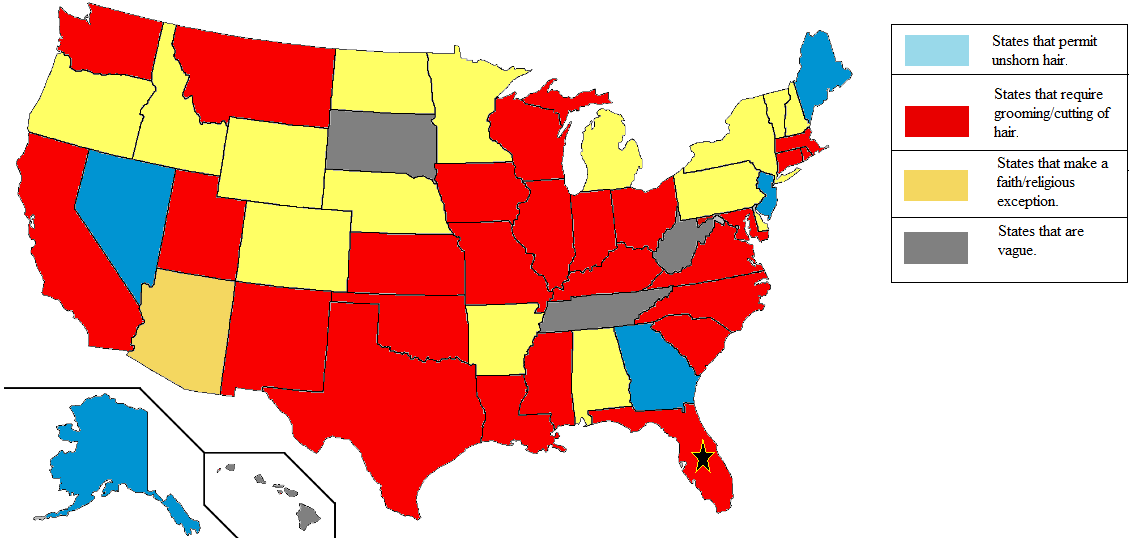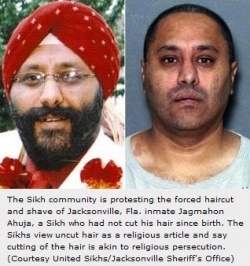UNITED SIKHS Documents State and Federal Prison Rules and Highlights the Challenges We Still Face to our Basic Religious Freedoms Ten Years Later
Highlights:
- Federal Judge rules that inmates have no right to grow beard
- September 2010 Marked 10 year anniversary of the religious rights of prisoners.
- UNITED SIKHS needs your SUPPORT to continue to battle injustices our community faces both internationally and domestically. Please generously support our Protect Our Identity (POI) global campaign. Donate now!
CONCORD, NEW HAMPSHIRE: Albert Kuperman, a 25 year old orthodox Jew, is a prison inmate who’s been prohibited from growing a beard. Federal Judge Steven McAuliffe recently ruled that inmates have no First Amendment right to grow facial hair, even over Constitutional arguments about free exercise of religion and expression. The court stated that hygiene and security are more important than these rights, a ruling that may adversely effect Sikh inmates nation-wide.
This ruling came in September, a month that marked the tenth anniversary of the Religious Land Use and Institutionalized Persons Act (RLUIPA). RLUIPA was passed in the year 2000, providing added protections against state and local governments from imposing burdens on free exercise of religion in prison. According to Milton Zelermyer, a prisoners’ rights attorney for the New York Legal Aid Society, Congress unanimously passing RLUIPA was a “rare display of interest in the rights of prisoners”. Previously the Department of Corrections dominated the field of prisoner rights. However, according to attorney Marc Stern, RLUIPA “put a new balance on claims of inmates versus their keepers, because the general rule of prison cases very much favors prison authority, so there’s been some leveling of the ground.”
RLUIPA has created some change, but not enough, as evidenced by the Kuperman case. Only five states outright permit unshorn hair, and less than a quarter of the fifty states make a faith/religious exception for RLUIPA, at least in the context of Sikh rights involving the kesh (unshorn hair) and dastaar (Sikh turban). This is precisely why UNITED SIKHS has advocated for changes to these prohibitive policies.

- Alabama, Arkansas, Arizona (limited), Colorado, Delaware, Idaho (limited), Michigan, Minnesota, Nebraska, New Hampshire (limited), New York, North Dakota, Oregon, Pennsylvania, Vermont, and Wyoming all make religious exceptions for the cutting of hair as long as within security and hygiene parameters.
- Alaska, Georgia, Maine, Nevada, and New Jersey allow for unshorn hair.
- California, Connecticut, Florida (no judicial process even allowed on the issue), Illinois, Indiana, Iowa, Kansas, Kentucky, Louisiana, Maryland, Massachussets, Mississippi, Missouri, Montana, New Mexico (limited), North Carolina, Ohio, Oklahoma, Rhode Island, South Carolina, Utah, Virginia, Washington, Wisconsin require cutting of hair in prison.
- Hawaii, South Dakota, Tennessee, West Virginia have been vague on their position on the issue.
The rights of Sikh prisoners to maintain their identity is often threatened despite progressive legislation such as RLUIPA. For example, Jagmohan Singh Ahuja, a Sikh inmate at Duval County Jail in Jacksonville, Florida repeatedly had his hair forcibly cut and face shaved by guards. His hair had remained uncut since birth, unshorn hair (kesh) being one of the five sacred articles of faith in Sikhism.
This symbol of his piety is not just an appearance; it is a vital organ, felt so deeply to devout Sikhs that removing this hair would be akin to removing the heart. The Sikh community was devastated when the guards shattered Mr. Ahuja’s articles of faith in this way. UNITED SIKHS rallied behind him, staging peaceful demonstrations in Jacksonville to end these violations. UNITED SIKHS also wrote an action letter to Governor Charlie Crist, explaining the importance of these articles of faith and arguing that the law is on Mr. Ahuja’s side.

Even Guantanamo Bay Prison, where many human rights abuses have been committed, allows inmates to keep some sort of beard, yet, this was not an option for Mr. Ahuja. His beard was shaved down to the skin. It seems that these prison officials don’t understand that the kesh is more than just hair. This is precisely why UNITED SIKHS continues to advocate on behalf of Sikh prisoner rights and to promote greater awareness of the Sikh identity.
While RLUIPA aims to protect the religious rights of prisoners, for Sikhs it’s not only inmates who are victims. Trilochan Oberoi wanted to become a prison guard at the California Department of Corrections (CDC). He is a highly decorated former commander in the Indian Navy and captain in the Indian Merchant Marines. However, the board of the CDC felt that Mr. Oberoi’s kesh would interfere with him wearing a gas mask over his face. They required him to shave just to be considered for the prisoner guard position. This meant that even if he shaved, he still may not have gotten the job.
Yet, other guards who could not shave because of skin conditions were not given this ultimatum. To make matters worse, Mr. Oberoi had worn gas masks during training at a Nuclear Biological Chemical Damage Control course in the Indian navy without any issue. After support by many human rights organizations, Administrative Law Judge Gregory Brown ruled that Mr. Oberoi’s application should be expedited, stating that “it is difficult to imagine why (the CDC) cannot extend the same accommodation to correction officers who cannot shave for religious reasons (as they did with correction officers with skin conditions).”
We must continue to push forward until RLUIPA is universally accepted and the religious protections it affords properly recognized. This physics of social change is millimetric – slow but forward progress. UNITED SIKHS is resolved to rid society of bigotry of all kind, using awareness and education to stop the dehumanization of Sikhs, and others, who may be forcibly shaved. Freedom of speech is nothing if one cannot exhale. Freedom of religion is nothing if one cannot manifest their faith. Let us work together, for we are all strangers in the same familiar struggle.
Hansdeep Singh, senior staff attorney at UNITED SIKHS says: “The defense of religious identity does not stop at the threshold of state or federal penitentiaries. Those who are incarcerated deserve the protection of their dignity, as all other Americans.”
Please read more about our work tackling issues such as our national campaign for protecting Sikh identity.








